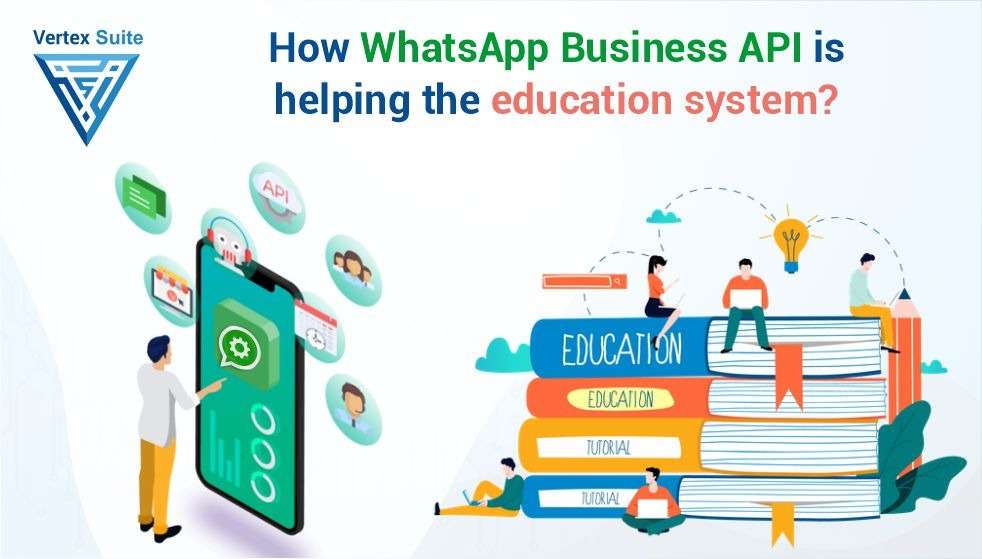Today's advanced technology and best marketing tools are helpful for the growth of any kind of business and it is also necessary, if you do not expand your business in social media, then you cannot grow your business globally, due to which your business will be limited to a limited growth.
And in this social media engagement, the education system is leaving its traditional and turning towards social media marketing, in which the best services are WhatsApp Business API. This is the marketing tool in which educational institutions can lay the foundation of better communication between teachers and students. Through WhatsApp API group, study material regarding any syllabus can be provided instantly, which can be in document, pdf, ppt etc. format.
With the help of WhatsApp API, educational institutions can share events, seminars, result notifications etc. and provide updates between teachers and students. This is the tool which is cheaper than other social media marketing and its opening rate is 70% higher than other paid social media marketing.
Let us tell you with its features how WhatsApp API is helping in the education system
1. A better communication solution:
With the help of WhatsApp API, educational institutions can provide communication channels for their students and their parents through which students, teachers and administrators can easily connect.
For example: Any school or university can create subject wise WhatsApp groups to improve their educational capabilities and provide a solution for direct communication between students and instructors.
2. Providing sudden notifications:
Through this communication, educational institutions can send instant notifications about sudden changes in education such as class cancellations, exam schedules and deadline reminders. This saves time for both students and teachers.
3. Personal group help:
With its help, students get a group according to their subject interest and can get immediate answers to their questions. Information related to subject interest can be provided through instructors or academic advisors. In this, information related to assignments can also be provided according to the subject.
4. Virtual Office Hours:
Using this WhatsApp API, professors can conduct instant office hours, through which students can be taught on important topics. Questions can be discussed. This promotes a supportive teacher environment.
5. Interactive learning option:
WhatsApp Business API provides the option of interactive learning through which students and teachers can connect in a better way through quizzes, polls and discussions.
For example, if a teacher teaches a topic and asks his students who understood it, he can ask them through a poll.
6. Feedback mechanism:
Educational institutions can take feedback from their students and teachers, which will help in knowing which teacher is better at teaching and which student is studying better. This will strengthen the education system.
For example, universities can improve the education system by collecting feedback from students on courses, instructors and facilities at the end of the exam.
7. Work on collaborative projects:
WhatsApp API enables collaboration on student group projects or assignments. Students can use WhatsApp groups to share ideas, coordinate tasks, discuss project deadlines, etc. This group will promote teamwork and foster a sense of community among students.
8. Study material sharing:
It enables sharing of study material specifically for students, such as lecture notes, study guides, and supplementary materials.
For example: In school, teachers can share PowerPoint presentations or PDF documents with students through WhatsApp chat, giving students easy access to all the material for their curriculum.
9. Peer-to-peer support:
Students can provide peer-to-peer support to each other through WhatsApp groups. For example, WhatsApp is able to help each other with homework, discuss exam related topics, overcome academic challenges, etc. This is the option where WhatsApp allows students to share answers to their questions, share insights, exchange advice, etc.
10. Sharing event coordination information:
Educational organizations can use WhatsApp API to coordinate event information such as annual functions, meetings, seminars, etc. with students and teachers.
For example: Student organizations can create WhatsApp groups to plan events, distribute events, and communicate logistics with participants.
11. Parent engagement:
This API creates a space for parents and teachers to discuss their students' learning and share updates on student progress, behavior, and academic performance. Using the WhatsApp API, schools can create WhatsApp groups for parents to share important announcements or get feedback on school initiatives.
12. Language learning:
This API enhances the language learning experience, allowing students to practice language skills through text-based communication.
For example: Language instructors can create WhatsApp exchange groups where students can interact with native speakers and practice conversation skills.
13. Exam Preparation:
This is where you can help students prepare for exams by providing them access to study materials, practice questions, and exam tips.
For example: Teachers can share review guides or flashcards with students via WhatsApp chat, helping them prepare more effectively for exams.
14. Community Building:
WhatsApp API helps foster a sense of community among students, teachers, and administrators, creating a strong network and opportunities for collaboration. With the help of this WhatsApp API, you can use it to facilitate educational institution discussions, share success stories, and celebrate achievements within the academic community. It indirectly acts as a newspaper for your business.
15. Data analytics and insights:
The data analytics and insights contained in its centralized dashboard help analyze individual student experiences and provide valuable data about their interests, communication patterns, and preferences. The data generated helps your institution inform better decision-making processes.
16. Management Chatbot:
Verified Chatbot provided by the school can provide students with information on admission process, fee details, school brochures etc. through interactive messages. You can get every little information like how experienced the teachers are, what is the average passing rate of the school etc.
Education System vs. WhatsApp API Integration
Traditional Education System:
Strength: The ability to create personalized conversations, structured spaces and communities
Limit: Slow communication, limited accessibility and dependence on physical resources.
Integration of WhatsApp API:
Advantages: Enhances communication with two-way messages and instant notifications. Increases accessibility by enabling remote assistance anytime, anywhere. Promotes interactive learning through multimedia content and real-time quizzes. Streamlines administration using data management and automated processes. Helps parent-teacher create digital reports and manage programs.
Barriers: Digital divide due to different smartphone and internet access Privacy and security of student information Potential over-reliance on technology that reduces face-to-face interactions
Integrating WhatsApp API in education increases efficiency and engagement, but solving digital access and privacy issues is needed to create a balanced and successful learning environment.
WhatsApp can leverage nature to lead to better academic outcomes, increased student satisfaction, and a more beautiful learning experience.


